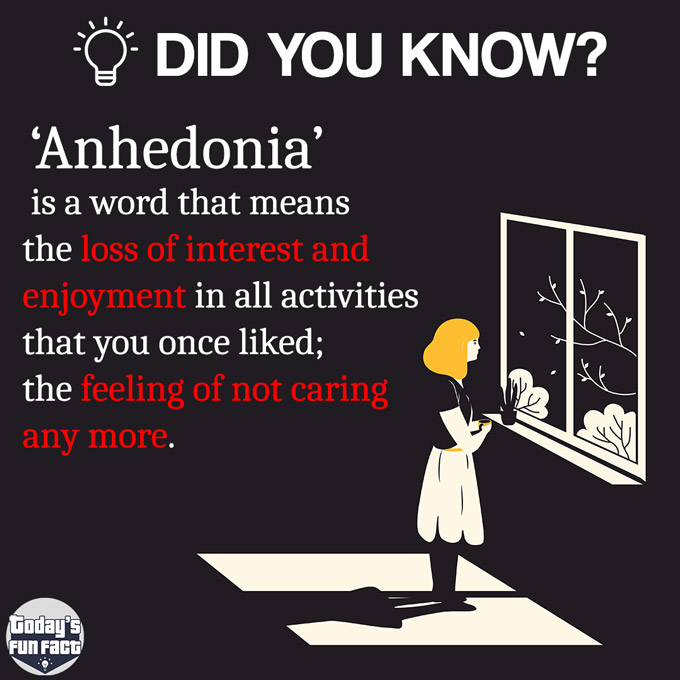
“Anhedonia” Is The Name For The Feeling Of Not Caring Any More Graphic © todaysfunfact.com. Background photo: Pixabay (PD)
What brings joy to your life? What makes you feel ‘alive’? Perhaps it’s gaming or binge-watching your favorite show after a long day. Maybe it’s hanging out with friends and family. But imagine if all the things you derived satisfaction from just didn’t anymore. This is anhedonia.
According to the American Psychological Association (APA), anhedonia is the “inability to enjoy experiences or activities that normally would be pleasurable.” It’s a feeling of numbness or detachment that could signal an underlying mental health condition.
Causes and Symptoms of Anhedonia
Anhedonia is linked to depression, schizophrenia, substance abuse, living with PTSD, an eating disorder, or chronic illness. The symptoms can be categorized as physical (relating to the loss of tactile pleasures) or social (relating to disinterest in interpersonal relationships).
While the severity of anhedonia may differ, some common symptoms of the condition include:
• Your favorite foods taste bland and eating no longer triggers the response it did.
• You no longer derive comfort from physical touch, including holding hands or hugging
• Low libido or a lack of interest in sexual intimacy
• Avoiding social situations because you don’t see the point or reward in participating
• Feelings of compassion or empathy are low or non-existent.
• Little-to-no motivation to interact with others, pursue meaningful relationships, or make social plans.
• Withdrawal from relationships and disinterest in forming new ones.
Diagnosis and Treatment
While anhedonia could signal a serious mental health issue, avoid self-diagnosis. If you feel you or a loved one could be experiencing the symptoms highlighted above, talk to your doctor for a proper diagnosis. They’ll ask some diagnostic questions, perform a physical exam, and sometimes request a blood test to rule out other medical conditions such as hormonal issues or nutrient deficiencies.
If diagnosed, treatment often starts by addressing the mental health issue. Your primary doctor may refer you to a mental health professional for care.
Types of treatment you can expect include talk therapy or prescription medication.
What is the Outlook?
If you’ve noticed a waning interest in things that used to excite you, help is available! Your negative feelings are not your fault—and you don’t have to live with them. Contact a mental health professional or doctor. Anhedonia typically goes away as the underlying condition is managed.
